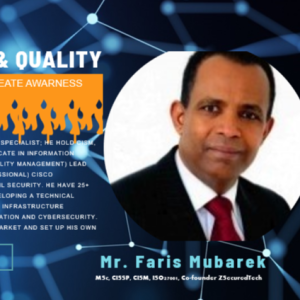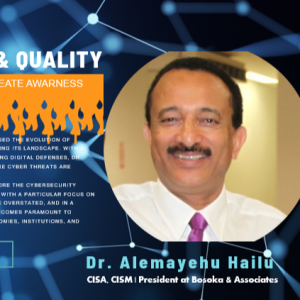Episodes

Saturday Nov 04, 2023
Saturday Nov 04, 2023
In a recent engaging discussion with our special guest, Mr. Faris Mubarek, we delved into a wide range of topics, shedding light on the current state of cybersecurity, its impact on various sectors, and the pressing need for awareness and inclusivity. Here's a brief overview of the key points from our enlightening conversation:
Ecysa: An Organization on the Rise
Faris Mubarek is not only an accomplished professional but also the founding member and executive director of Ecysa, a rapidly growing organization set to make significant contributions to the public and private sectors in the realm of cybersecurity. With Cybersecurity Awareness Month in full swing, Ecysa is gearing up to participate in multiple events, emphasizing the importance of cybersecurity in today's digital landscape.
Cyber Threats Targeting GERD
During our discussions and events, we learned that the Grand Ethiopian Renaissance Dam (GERD) is a prime target for cyberattacks. In response, the Information Network Security Agency (INSA) has expressed its intention to collaborate with the private sector to bolster cybersecurity defenses and protect critical infrastructure.
Cybersecurity Awareness in Africa
A striking statistic emerged during our conversation: a staggering 90% of private businesses in Africa lack a cybersecurity policy, rendering them vulnerable to cyberattacks. Fortunately, there's a growing recognition among these businesses of the paramount importance of cybersecurity.
The Cost of Cybercrime
A stark reminder of the consequences of inadequate cybersecurity practices, Ethiopia recently suffered substantial financial losses, totaling over 1.9 billion Ethiopian Birr, due to cyberattacks. These losses stemmed from a combination of cybercrime and user negligence.
The Urgent Need for Cybersecurity Culture
One resounding message that came through was the critical need for a cybersecurity culture. This culture encompasses awareness, ensuring the technologies we use have robust cybersecurity protections, and organizations taking significant steps to protect their data.
Cybersecurity Policies in Ethiopia
One concerning revelation is that, currently, only banks in Ethiopia have comprehensive information security policies. A multitude of private entities lack such security policies, which leaves them vulnerable to cyber threats. The approval of the National Data Protection Act is eagerly awaited, as it promises to play a pivotal role in enforcing information security standards across the board.
Empowering the Youth
Faris Mubarek is actively engaged in nurturing the next generation of cybersecurity professionals. He recently conducted a 40-hour cybersecurity training program at INSA, catering to a diverse audience, including high school students and professionals. This underscores the importance of building a skilled and aware workforce, starting from a young age.
Gender Diversity: A Growing Imperative
Our discussion also highlighted the underrepresentation of women in the cybersecurity field in Ethiopia. The need to encourage and equip women to pursue careers in cybersecurity is evident, and Mr. Faris emphasized the role of the government in diversifying the workforce in terms of gender.
Our conversation with Mr. Faris Mubarek illuminated the critical nature of cybersecurity in today's world, with a specific focus on Ethiopia. It served as a reminder that cybersecurity is not only a technical challenge but also a cultural and societal one. As we navigate this ever-evolving landscape, it's essential to remain vigilant, promote awareness, and work towards a more inclusive and secure digital future.

Saturday Oct 21, 2023
Exploring Cybersecurity Challenges and Impact in Africa and Ethiopia
Saturday Oct 21, 2023
Saturday Oct 21, 2023
Africa, and Ethiopia specifically, is not immune to the global wave of cyber threats. As technology continues to weave itself into the fabric of societies and economies across the continent, the stakes are higher than ever before. Cybersecurity isn't merely a technical matter; it's a matter of national and economic security.
We delve into the critical cybersecurity challenges faced by this region, assess the level of awareness and knowledge in both public and private sectors, identify the sectors most vulnerable to attacks, and examine the real-world impact of cybersecurity incidents.
In a recent episode of our podcast, we had the privilege of hosting Dr. Alemayehu Hailu, a distinguished expert in the field of cybersecurity and audit. Dr. Hailu's extensive experience and insights shed light on the current state of cybersecurity in Africa and Ethiopia, and the path forward to secure our digital landscape.
Journeying into Cybersecurity in Africa and Ethiopia
The podcast began with a focus on cybersecurity and audit topics, delving into the unique challenges faced by Africa and Ethiopia in this ever-evolving digital age.
Dr. Hailu expressed his keen interest in contributing to the cybersecurity landscape in Africa and Ethiopia. He is actively seeking the right organization to join, aiming to make a significant impact in these regions.
Unveiling Critical Cybersecurity Issues
One of the critical issues highlighted was the alarming rise of cyberattacks in the financial sector. With an astounding 20% success rate, these attacks pose a significant threat. Moreover, the presence of underground cybersecurity activities and the financial needs of unemployed youth are driving individuals towards cybercriminal activities.
Challenges and Cyber Resilience
While awareness of cybersecurity issues exists, active mitigation efforts remain inadequate. This holds particularly true for Ethiopia. Dr. Hailu stressed the importance of proactively executing programs such as policy and standards development, vulnerability assessments, continuous monitoring, patch management, and backup procedures.
A growing concern is the increasing organization and frequency of cyber threats, driven by individual financial needs.
The Imperative of Collaboration
Dr. Hailu emphasized the need for collaboration not only within African countries but also internationally. Cybersecurity threats have no boundaries, and proactive relationships with other nations are vital in tackling these challenges.
Bridging the Awareness Gap
While governments and some individuals are aware of cybersecurity, the awareness level varies. Dr. Hailu called for a maturity level comparable to physical security. As mobile financial services become more widespread, building cybersecurity measures into systems from the start is crucial.
A Continuous Journey of Awareness
October is designated as Cybersecurity Awareness Month, and the Ethiopian government has taken steps to amplify cybersecurity awareness. Dr. Hailu stressed that cybersecurity awareness should be a continuous program. Simulated phishing email exercises, as demonstrated by his own company, can be valuable tools for raising awareness.
The Human Element in Cybersecurity
Dr. Hailu emphasized that many cybersecurity incidents are a result of human actions and processes, not just technology. Strengthening procedures and processes, and ensuring their enforcement, is key to cybersecurity resilience.
The Broader Perspective
Cybersecurity is not solely about technology; it encompasses information system security, physical security, and more. Dr. Hailu underscored the importance of awareness regarding incidents such as the compromise of mobile devices and internet-related activities.
The Role of Government
Governments play a crucial role in personal data protection and accountability. Policies and risk mitigation measures are essential in the realms of banking and e-government solutions.
Cybersecurity Quality and Audit
Dr. Hailu introduced the concept of "Cyber Sequality," merging cyber and quality. Auditing processes and procedures, including both physical equipment and software, plays a pivotal role in ensuring cybersecurity quality. Audit liaison members participating in the organization can ensure compliance with regulations and standards.
Learning from Advanced Cybersecurity Countries
To strengthen cybersecurity, Dr. Hailu recommended a comprehensive approach encompassing people and processes. Adapting NIST and ISO standards, implementing vulnerability assessments, patch management, risk management programs, and awareness initiatives are all essential. Enforcing training and security certifications, along with system certification, provides a solid baseline for cybersecurity.
In a world where digital threats continue to evolve, Dr. Alemayehu Hailu's insights serve as a guiding light for Africa and Ethiopia, emphasizing the importance of proactive cybersecurity measures, collaboration, and awareness. With a comprehensive approach that includes technology, people, and processes, we can navigate the complex cybersecurity landscape and safeguard our digital future.

Saturday Jul 16, 2022
What is CyberSeQuality?
Saturday Jul 16, 2022
Saturday Jul 16, 2022
A podcast show focus on African Cybersecurity and Information system Audit initiative.
Where Jay & Teddy "boiling" African Cybersecurity and quality assurance challenges with African ICT sector professionals and responsible officials from Atlanta and Helsinki.
